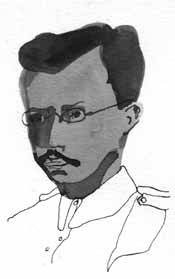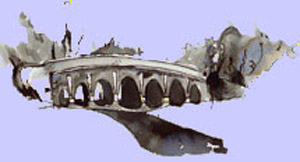|
|
|
| Feature Articles: Famous Napsbury Residents |
| A series of articles on famous Napsbury Hospital Residents |
| Ivor Gurney (1890-1937) |

The Gloucestershire poet and composer Ivor Gurney (1890-1937) was born on 28th August 1890 and educated as a chorister at King’s School, Gloucester, where he won a scholarship to the Royal College of Music. Gurney wrote both poetry and music from the early age of 14. He volunteered as a private for the Gloucester Regiment at the outbreak of war and although he was initially rejected because of poor eyesight; he finally succeeded in joining the 2nd and 5th Gloucestershire Regiment in 1915. First wounded in April and then gassed in September 1917 whilst serving in France, Gurney was sent home. Shunted around from hospital to hospital, he washed up in the summer of 1918 in No 8 Ward, Napsbury Hospital, then The Middlesex War Hospital. 1
The regime at Napsbury was enlightened, particularly towards the end of the war. In those days it was common for officers to be credited with finer feelings than men. Men were more often judged to be either congenitally damaged, which meant they were swiftly passed on to permanent mental institutions, or malingering, resulting in an equally swift return to the front. At Napsbury, patients of all ranks were encouraged to work on the hospital farm allowing many space and time to patch together their own recovery programme.
Ivor Gurney wrote, referring to less happy times as a patient at Warrington:
‘We decouch ourselves at 6.15 or so; breakfast at 7.45 and get out on farmwork at 8.30 or thereabouts to hoe the patient mangel or collect the elusive spud; reap dock and thistle; the general care of management of all farm life weighs lightly, however, and we can see trees and clouds, flowers and men as can the rest of outdoor people. A lucky life compared to Warrington’s enclosed existence.’
The ‘Napsbury cure’ appeared to work, for in September 1918 he was well enough to be discharged to the care of his parents in Gloucester. The army took the view that his illness had been ‘aggravated but not caused’ by war and awarded him a partial pension. After his return to civilian life he found it impossible to conquer his mental health problems. He continued a self-imposed regime of hard work and study begun before the war to combat what he termed his ‘neurasthenia’ but an attempt to return as a student to the Royal College of Music failed. A number of jobs of short duration as church organist and cinema pianist followed, as did work as a farm labourer and in Gloucester Tax Office. He was certified insane in 1922 after repeatedly attempting suicide and was eventually admitted to the City of London Mental Hospital in Dartford where he remained until his death from tuberculosis on 26 December 1937.
Recent students of his life and work have categorised him as a 2paranoid schizophrenic. Unusually for someone suffering from such a severe illness, he remained able to express himself lucidly through poetry and music and he was most productive during his time at Dartford. He wrote and composed in the most difficult circumstances imaginable, producing hundreds of poems as well as approximately 300 songs in addition to instrumental music when standing ankle deep in mud in the trenches and while suffering severe delusions as well as physical illness in hospital. He constantly reworked his verse to impose discipline, ‘squareness’ as he called it, and strove to mitigate the effects of his illness on his completed work. His friends and supporters, many of them eminent poets and musicians such as Vaughan Williams and Edmund Blunden, believed in his talent and tried to keep his work in the public eye during his lifetime. An increased interest in the ‘war poets’ in the latter part of the 20th century has meant that Ivor Gurney is now recognised as a major talent whose illness gave his work ‘peculiar unconventionality’ and ‘uncommon melody’3
Maria Aguado
‘Migrants’, also in this issue, was written during Gurney’s stay at Napsbury and is reprinted by permission of Carcanet Press UK
1 Peter Barham Remembering the lunatics of The Great War
http://www.psychminded.co.uk/news/news2004/nov04/lunatics.htm November 2004
2 George Walter Introduction to ‘Rewards of Wonder’ Carcanet 2000
3 Edmund Blunden (1953) |
|
|




